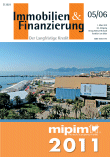Sie befinden sich hier: Home › Immobilien & Finanzierung › Ergänzende Informationen › Archivdaten › Corporate real estate as a capital source
Archivdaten
01.03.2011
Mipim Special
Corporate real estate as a capital source

Dieser Artikel ist Teil unseres Online-Abo Angebots.
Immobilien & Finanzierung, Ausgabe vom 01.03.2011, Seite 172
Archivdaten
2,60 €
1061